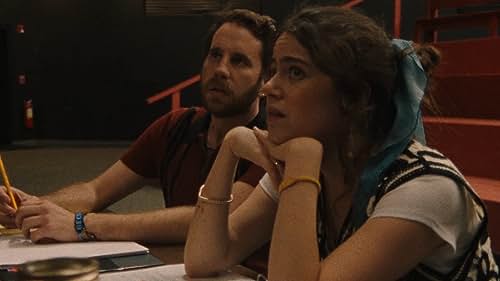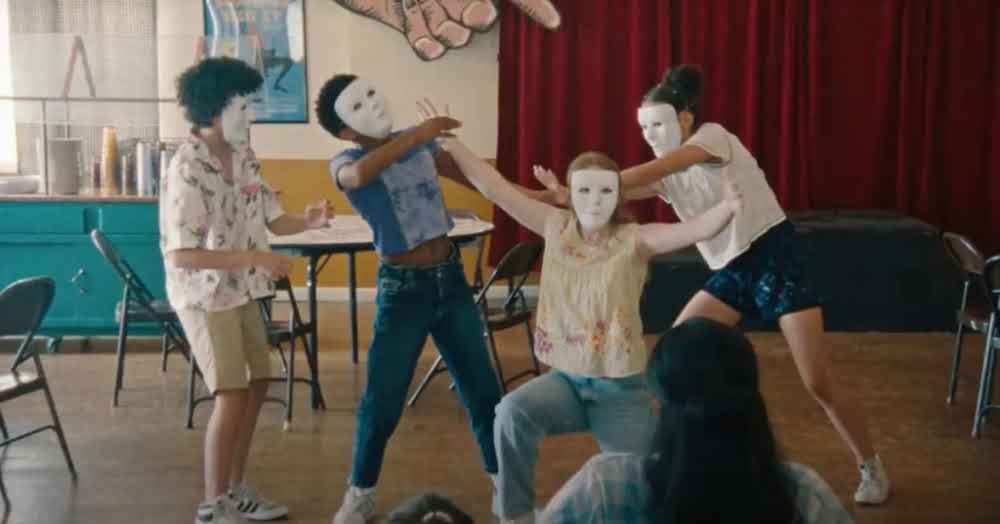Few would be more qualified to depict the goings on at a theatre camp than the creators of Theater Camp, who include writer-director-star Molly Gordon, a stage vet, and star Ben Platt, who originated the role of Evan Hansen on Broadway. Those two have been stage besties since they were wee little tots starring in a performance of How to Succeed in Business Without Really Trying, and this movie provides us the videotape of young Molly and Ben to prove it.
The question, then, is whether that’s enough to give us a funny movie with heart, or whether the whole thing feels like a laboured improv class exercise – the very thing that makes the rest of us roll our eyes at people who call themselves “thespians.”
Perhaps the answer is telegraphed in the phrasing of that question. Even if you have a history in stage performance, as this critic does, it’s possible to sit there stone-faced for the entirety of Theater Camp’s brief 92 minutes. The jokes are recognisably structured as jokes, and they feel like they have some basis in reality. What’s more, this sort of fake documentary has sturdy roots in the works of actor-director Christopher Guest. What makes one comedic context sing and another fall flat is one of the great mysteries of writing, but you understand it instinctively when you see it. Theater Camp shares only the most desperate parts with Guest’s work, which would become his more predominant mode as time went on.
The unseen documentary crew of this movie were meant to be following and interviewing Joan Rubinsky (Amy Sedaris), the founder and director of a summer theatre camp called AdirondACTS, which gets its name from its Adirondack Mountains setting in upstate New York. Unfortunately, Joan seized from the strobe lights of the thinly veiled Elvis musical Bye Bye Birdie performed by school kids she was recruiting to help the camp through its financial troubles, leaving her comatose.
Undeterred, the documentary crew shifts its focus to Troy (Jimmy Tatro), Joan’s son, a vlogger in love with his GoPro who says things like “That’s what’s up” and talks about things being “lit.” The apple fell far from Joan’s tree in this case, but Troy does fancy himself a shrewd businessman, so he’s got ideas how to make the camp profitable to avoid foreclosure. That’ll rely heavily on another successful season from returning instructors Amos (Platt) and Rebecca-Diane (Gordon), though they don’t come without baggage – he’s a hopeless narcissist and she moonlights in performing seances. Both are failed would-be performers, which colours that baggage and their dynamic.
Other crew include the tech head Glenn (Noah Galvin, who co-wrote the film with co-directors Gordon and Nick Lieberman), lead costumer Gigi (Owen Thiele), dance instructor Clive (Nathan Lee Graham) and jack-of-all-trades Janet (Ayo Edibiri), who lied on her CV and said she knew how to teach stage combat and accent work, among other furphies. Filling out the cast are a manipulative corporate type from a rival camp (Patti Harrison), who preys on Troy’s naivete in trying to seduce the camp’s desirable real estate out from under him, as well as all the campers.
The influence of Guest and his movies, particularly the theatre-focused Waiting for Guffman, are all over Theater Camp. Guest was big on his absurd titles and concepts – Guffman lead Corky St. Clair, played by Guest himself, had action figures from the movie My Dinner With Andre – and those are in ample evidence here, as some of the campers are staging a performance of The Crucible Jr. The original musical Amos and Rebecca-Diane are writing this season, the analogue to Guffman’s Red White and Blaine, is called Joan Still, and is based on the life of the comatose founder. They have only three weeks to write it before opening night, a real strain on anyone’s notion of credibility, though Theater Camp is surely not going for that.
Why this stuff doesn’t work better may have several explanations. One is that the format of the mockumentary is pretty stale by this point, with Guest having run it into the ground cinematically, and any number of television comedies then breathing life into it before tiring us of it again. The bigger problem, though, is that the absence of laughs where laughs should be is impossible to overlook. Comedy is famously in the eye of the beholder, so whether these jokes strike a particular viewer as funny may be a function of how they’re feeling in the moment and their familiarity with the thing being lovingly lampooned. Then again, this particular viewer had that familiarity and still left unimpressed.
The cast may also be a factor. Gordon, a really likable actress, doesn’t ingratiate herself to us here. She’s supposed to be a bit annoying and self-involved, but underneath we are meant to find a dedicated professional whose truth we can understand. We don’t really get there unfortunately. Platt is not a very likable actor and was downright laughable in the film version of Dear Evan Hansen. While we don’t quite get there with Gordon, we aren’t even close with Platt, whose narcissism is malignant until the film gives him a false redemption. Tatro is probably the most sympathetic of the leads but his bro antics weigh him down. No camper has a significant showcase in the narrative, which might have distracted us from the disagreeable alternatives.
And yet these words of caution about Theater Camp must be tempered by the acknowledgement that this was chosen as the closing night film of MIFF, and more audiences do seem to have embraced it than not. The purpose of a review, of course, is not to provide a critical or audience consensus perspective on a film – we have Rotten Tomatoes for that. It’s to provide one person’s perspective. And to the extent that this perspective comes from both a cinephile and a lover of musical theatre, it has more than replacement-level merit.
Theater Camp is currently playing in cinemas.



